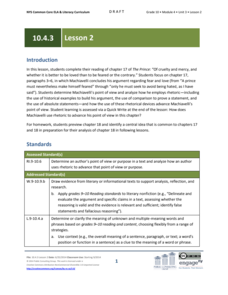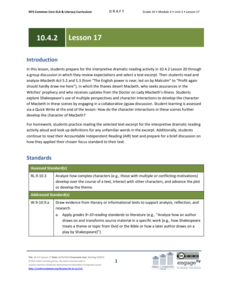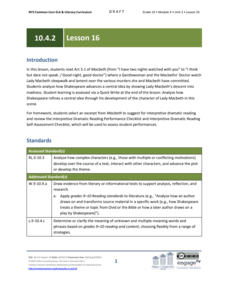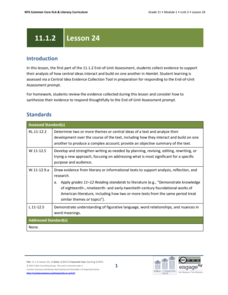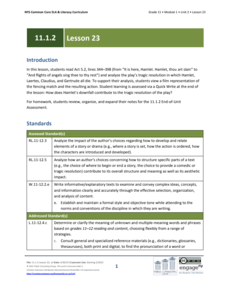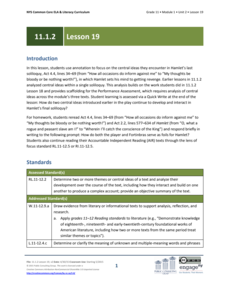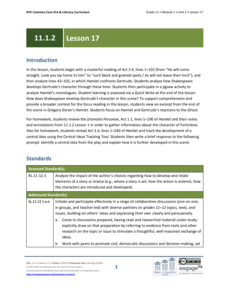EngageNY
Grade 10 ELA Module 4: Unit 2, Lesson 19
A tragic play includes imperfect heroes, pity and fear, and a fatal flaw. Scholars analyze Shakespeare's Macbeth as an example of the tragedy genre. Pupils demonstrate understanding by completing a Quick Write discussing how Shakespeare...
EngageNY
Grade 10 ELA Module 4, Unit 2, Lesson 21
Which character bears responsibility for the tragedy in Shakespeare's Macbeth? Scholars participate in a gallery walk and complete a Quick Write to support their claims about which character is to blame.
EngageNY
Grade 10 ELA Module 4: Unit 2, Lesson 9
How does Shakespeare develop the central idea of agency versus fate in Macbeth? Using the resource, pupils work in small groups to discuss the plot of Act 3.1. Next, they complete a brief writing assignment to analyze how the main idea...
EngageNY
Grade 10 ELA Module 4: Unit 2, Lesson 5
When Macbeth says, "Nature seems dead," he uses personification. Using the resource, scholars complete a Quick Write to analyze the impact of figurative language on the mood of Shakespeare's Macbeth. Pupils also participate in an...
EngageNY
Grade 10 ELA Module 3: Unit 3, Lesson 9
Let's join together and make a sentence. Scholars take the next step in revising their argumentative essays by combining independent clauses to make complex sentences. Writers use a Colon and Semicolon Handout to practice different ways...
EngageNY
Grade 10 ELA Module 4: Unit 2, Lesson 13
Lady Macduff uses a metaphor to suggest that her husband does not possess the courage of even a tiny, short-winged bird—ouch! Using the resource, pupils discover Act 4.2 of Shakespeare's Macbeth. Using reading, writing, and discussion,...
EngageNY
Grade 10 ELA Module 4: Unit 2, Lesson 11
How does Shakespeare develop the idea of appearance versus reality in Macbeth? Using the resource, pupils discuss the plot in small groups. Scholars also complete a Quick Write analyzing how the interactions between Macbeth and Lady...
EngageNY
Grade 10 ELA Module 4: Unit 2, Lesson 10
Is it better to be dead than to "dwell in doubtful joy," as Lady Macbeth suggests in Act 3.2 of Shakespeare's Macbeth? Using the resource, scholars work in small groups to discuss how Lady Macbeth and Macbeth begin to unravel following...
EngageNY
Grade 10 ELA Module 4, Unit 2, Lesson 25
How do film adaptations differ from their literary counterparts? Scholars watch and analyze the 2011 Royal Shakespeare Company (RSC) production of Shakespeare's Macbeth. Pupils complete a Quick Write analyzing how the RSC production...
EngageNY
Grade 10 ELA Module 4: Unit 3, Lesson 3
What's the difference between men and princes? Machiavelli discusses this distinction in chapter 18 of The Prince. Scholars first listen to a masterful reading of the chapter. Then, they write about how the author develops a central idea...
EngageNY
Grade 10 ELA Module 4: Unit 3, Lesson 2
How do rhetorical devices advance an author's point of view? Scholars consider this question as they continue exploring Machiavelli's The Prince. They work in small groups, annotating the text for evidence of rhetoric before engaging in...
EngageNY
Grade 10 ELA Module 4, Unit 2, Lesson 24
What might viewers notice about the characters, setting, and cinematic choices in the movie version of a play? Pupils view an excerpt from Throne of Blood, Akira Kurosawa's film adaptation of Shakespeare's Macbeth. To finish the lesson...
EngageNY
Grade 10 ELA Module 4: Unit 2, Lesson 17
Madness, violence, despair—the titular character of Shakespeare's Macbeth is spiraling out of control. Pupils first explore the topic with a collaborative jigsaw discussion. At the end of the instructional activity, they write about how...
EngageNY
Grade 10 ELA Module 4: Unit 2, Lesson 16
How do complex characters develop throughout a text? Pupils read Act 5.1 from Shakespeare's Macbeth, which depicts Lady Macbeth's descent into madness. Using discussion and writing exercises, scholars analyze how Shakespeare develops...
EngageNY
Grade 11 ELA Module 1: Unit 3, Lesson 3
Virginia Woolf didn't believe a woman could have written Shakespeare's works. Using the resource, scholars engage in a silent discussion to analyze how Woolf uses rhetoric to convey her point of view in A Room of One's Own. Pupils write...
EngageNY
Grade 11 ELA Module 1: Unit 3, Lesson 2
What was life like for William Shakespeare's sister, Judith? Scholars continue reading Virginia Woolf's A Room of One's Own to find out. They complete a Quick Write to explain how Woolf's comparison of the siblings develops a central...
EngageNY
Grade 11 ELA Module 1: Unit 2, Lesson 24
How do central ideas build on each other in Shakespeare's Hamlet? Scholars begin the first part of an end-of-unit assessment. They complete a Central Idea Evidence Collection Tool worksheet to prepare for a writing activity to discuss...
EngageNY
Grade 11 ELA Module 1: Unit 2, Lesson 22
Scholars explore Act 5.2 of Shakespeare's Hamlet, in which Hamlet and Laertes injure each other with a poisoned blade. To finish the lesson plan, pupils also write about two central ideas from the play.
EngageNY
Grade 11 ELA Module 1: Unit 2, Lesson 23
All's well that ends does not apply to Shakespeare's Hamlet. Scholars read Act 5.2 using the resource, discovering the play's tragic resolution. Pupils complete a Quick Write analyzing how Hamlet's downfall contributes to the play's...
EngageNY
Grade 11 ELA Module 1: Unit 2, Lesson 20
How does the setting impact other elements within a play? Using a helpful resource, scholars explore the question by completing a Quick Write after reading Act 5.1 of Shakespeare's Hamlet. Additionally, they engage in a whole-class...
EngageNY
Grade 11 ELA Module 1: Unit 2, Lesson 19
If revenge is a dish best-served cold, Hamlet had better get some ice. Readers discover Hamlet's plan to seek revenge. Scholars also complete a Quick Write analyzing the central ideas in Act 4.4 of Shakespeare's Hamlet.
EngageNY
Grade 11 ELA Module 1: Unit 2, Lesson 17
Why is Hamlet so upset with Gertrude? Using the resource, scholars read Act 3.4 of Hamlet, analyzing how Shakespeare develops Gertrude's character in the scene. Next, pupils participate in a jigsaw activity to discuss Hamlet's monologues.
EngageNY
Grade 11 ELA Module 1: Unit 2, Lesson 16
Using the resource, scholars read Act 3.3 of Shakespeare's Hamlet. They analyze two soliloquies and discuss how Shakespeare develops the characters.
EngageNY
Grade 11 ELA Module 1: Unit 2, Lesson 14
How do Ophelia's interactions with Hamlet help develop her character? Pupils continue reading Act 3.1 from Shakespeare's Hamlet. Using writing and discussion, scholars analyze the dialogue between Hamlet and Ophelia, paying particular...
Other popular searches
- Cellular Differentiation
- Cell Differentiation
- Implicit Differentiation
- Genetic Differentiation
- Differentiation and Math
- Anti Differentiation
- Differentiation Strategies
- Differentiation Rule
- Differentiation Lesson Plans
- Logarithmic Differentiation
- Differentiation Component
- Writing Differentiation










